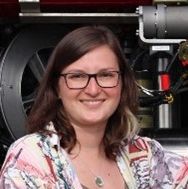- Graduate School GLOMAR
- PhD student members
- Eva-Maria Meckel
Eva-Maria Meckel
| Institution: | Constructor University, Bremen |
| Office: | Research III, Room 100b |
| Phone: | +49 421 200-3257 |
| E-mail: | [Bitte aktivieren Sie Javascript] |
| Other webpage(s): | Eva's Constructor Uni web page |

PhD Project
Different roles of organic complexes for the transport of Cu and Fe in deep-sea and shallow hydrothermal vent fluids and plumes
Hydrothermal vent systems appear at the seafloor in geologically active areas such as mid-ocean ridges, volcanic arc systems, backarc basins and hotspot volcanoes. Their fluids withhold a unique chemistry created by fluid-rock interaction in the subsurface, which leads to transport of dissolved metals and other compounds towards the seafloor. The actual metal- and chemical composition is controlled by many factors including host rock lithology, temperature-pressure conditions, fluid pathways in the subsurface, water-to-rock ratio, phase separation, phase segregation, and magmatic degassing. As the fluids discharge from the hydrothermal system due to cooling and mixing with cold seawater, metals dissolved in the fluids precipitate as sulfide minerals, or in increasingly oxygenated environment as sulfates and oxides and are partly released into the water column via the hydrothermal plume in both dissolved and particulate form. Not only are hydrothermal fluids enriched in many metals, but they have also distinct dissolved organic matter (DOM) composition from background seawater. DOM containing metal-binding functional groups such as hydroxide (-OH-), thiol (-SH-) or amino (NH2) groups are known to play an important role for metal solubility, transport and consequences for mineral precipitation.
During my PhD I’m not only comparing natural samples from vent systems of two upcoming cruises with a wide variety of parameters influencing the complexes, I also want to conduct autoclave experiments at the University of Bremen in the working group of Prof. Dr. Wolfgang Bach to investigate complexing or degradation influenced processes of metal-organic ligands by adjusting temperature, pressure and host-rock effects and their insights to the molecular composition of the complexing organics. The natural samples for the project originate from the cruises in 2023 to Atlantic mid-ocean ridge hydrothermal systems (M190) and shallow and deep-sea hydrothermal systems in the Mediterranean Sea close to Milos (M192).
Thesis Committee
| Prof. Dr. Andrea Koschinsky-Fritsche | Constructor University, Bremen and MARUM - Center for Marine Environmental Sciences, University of Bremen |
| Prof. Dr. Michael Bau | Constructor University, Bremen |


